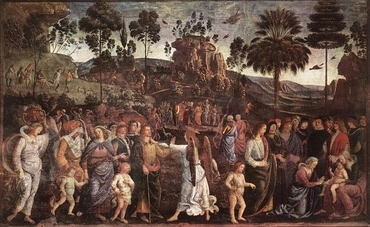
This strange little story has baffled scholars for centuries. Having just told Moses to go to Egypt, Jehovah meets him on the way with the intent of killing him. Why? The standard explanation is that Moses had not circumcised his son, as Jehovah had ordered for all descendants of Abraham. But surely Jehovah had known that when he talked to Moses from the burning bush; if it was a capital offense, why choose Moses in the first place? And why not remind him then? The Hebrews had, after all, been slaves for 400 years, and had so forgotten their religious roots that they did not even know Jehovah’s name. Can Moses really be held to blame? Besides that, how did Zipporah know what to do? She wasn’t even a Hebrew!
Those and other questions have caused many to write the passage off as fragmentary, a leftover piece of some more complete story. Understood spiritually, however, it’s clear that it illustrates an important moment in the formation of the Israelitish Church.
The Lord’s second great church, the Ancient Church, had fallen prey to human pride. At its height, it had possessed a vast knowledge of the correspondences between the natural world and the spiritual world, and had understood how things in the natural world served as forms and containers for spiritual things. As it fell, though, that knowledge turned into idolatry and magic, and even human sacrifice. The Lord needed to form a church that would preserve the proper natural forms so that when He later came to earth as the human Jesus, He could start filling in those forms with their true spiritual meaning again.
The Lord’s intent was to form that church among the descendents of Jacob. That group, however, was as hard-hearted and external in its thinking as any of the people around it – which is represented by Moses staying in a lodging-place. It was so hard-hearted, in fact, that it reacted with hostility to the leading of the Lord, represented by Jehovah’s intent to kill Moses.
Zipporah, however – who represents a remnant of the Ancient Church which still worshipped the Lord – used teachings from the Lord (the flint) to remove the most external loves of self and the world (the foreskin) and expose the people’s internal loves to the Lord. Those loves were as hellish as the external ones – represented when Zipporah called Moses her “bridegroom of blood” – but having them exposed allowed the Lord to control their external worship so that they could represent spiritual things.
That is pretty deep stuff and somewhat abstract, but as with all things in the Bible it also represents a stage we all go through in life. In many ways the “Children of Israel” represent all of us as children. Once past the innocence of infancy and the wide-eyed absorptive stage of toddler-hood, children – much as we love them – are relatively external in their interests and self-absorbed in their desires. At that age we force rules and structure on them, generally against their will, with the idea that they will eventually grow to see and embrace the deeper purposes behind the rules – which is very much what the Lord did with the Children of Israel.
This story, then, to some extent represents the foundation we lay with our children, the basic idea that we are in charge and they must obey, that they cannot control us and enforce their will. Their belief that they are and should be in control of their own lives has to be cut away for further rules to have any effect.
(References:
Arcana Coelestia 7040)







